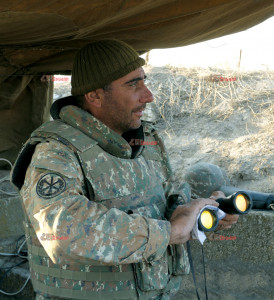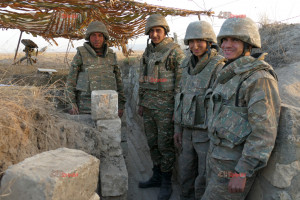“COMMANDER, POINT TO A MARK SO WE CAN HIT IT “
 In my hand is the war photo of the division commander, Lt Col Arsen Hakobyan. It was taken in battle positions, on the hottest days, at a moment of a relative break in the battle. The eyes are red from sleeplessness and fatigue. There is a winner’s smile on the face that is covered by dust, but calm and confident…
In my hand is the war photo of the division commander, Lt Col Arsen Hakobyan. It was taken in battle positions, on the hottest days, at a moment of a relative break in the battle. The eyes are red from sleeplessness and fatigue. There is a winner’s smile on the face that is covered by dust, but calm and confident…
Lt Col Hakobyan answers my questions directly, concisely and clearly, as he used to fight. The artilleryman, who has a great command of his work and has excellent combat skills in war, does not like to talk about what he has done. While his merit is not small. During his 25 years of service, he has successfully participated in various punitive actions, was involved in the April Four-Day battles, was awarded the Medal of Courage. The division he led fought heroically in this last war. With the determination not to retreat a single centimeter from the positions entrusted to him, they kept the positions invincible, performing all the combat tasks excellently.
“A person who has put aside his personal life and has completely dedicated himself to the service. A person who never thinks about how what he has done will be appreciated, but when he is needed, does what is possible and does the impossible, does it perfectly,” his fellow servicemen say about Lt Col Hakobyan. “We often considered him too punctual and too,” say the subordinates, “but after going through the ‘school’ of the war, we deeply understood and appreciated the real value of his strictness.”
The enemy was trying in vain to break through the defense zone of the division in all directions of the Artsakh Front. Strategically, this direction could have been maintained at all costs. If the breach was successful in this part of the border, the enemy army could invade, drive a wedge between Martakert and Stepanakert, reach Stepanakert in a few days, then Shushi. The adversary’s efforts became complicated. It had to turn around the whole right flank of Artsakh and rearrange, as a result of which it reached the outskirts of Shushi much later than planned and with great difficulty.
When it comes to the staff, Lt Col Hakobyan immediately becomes active and introduces his guys.
“Of course, I also suffered losses,” the commander says with pain and at the same time with great pride, “But the boys carried out the task even at the cost of their lives, they kept the positions entrusted to us.” We have caused great damage to the enemy. We have damaged a lot of military equipment – artillery batteries, permanent enemy positions, various targets, if I tell you all, I can talk for three hours. And the most impressive was the precise damage to the T-90 tank. Artillery is usually designed to hit larger targets, unlike high-precision weapons. Damage to the tank with artillery seemed technically impossible in these conditions, but we did it. And this was the result of a lot of experience and skill.
 The morale and enthusiasm of my staff were indescribable. When it happened that we did not shoot for a few minutes, my soldiers would ask, ‘Commander, why are you not giving us a target to hit?’ The guys on one battery were looking at the guys on the other battery with jealousy when I asked them, ‘What about us, Commander? You are forgetting us.” The same can be said about my officers. They acted very competently, with great dedication. I consider the work of the personnel of our unit excellent.
The morale and enthusiasm of my staff were indescribable. When it happened that we did not shoot for a few minutes, my soldiers would ask, ‘Commander, why are you not giving us a target to hit?’ The guys on one battery were looking at the guys on the other battery with jealousy when I asked them, ‘What about us, Commander? You are forgetting us.” The same can be said about my officers. They acted very competently, with great dedication. I consider the work of the personnel of our unit excellent.
With a smile, they happily jumped into battle, not knowing whether they would return or not. When our people were firing, the enemy was firing at them at the same time. When the position is under artillery fire, the personnel not only can but must hide, however, our soldiers continued to fire in those conditions. The boys realized at that difficult moment that only in this way was it possible to stop the enemy’s strong fire.”
The strict and experienced commander, before the war, apparently prepared the staff of his unit for military operations, first of all, psychologically. “There will be, there will be a war. We will also have victims… But we must all do our part clearly. And the most important thing for that everybody has full control of the weapon, in that case there will be no confusion, no problem, everything will turn out as we planned.”
“And so it happened. During the war, I remember one day we were going to have a night fire. Before that, night classes were an integral part of my unit’s training. When I started giving tasks, one of the platoon commanders joked. “Guys, we’re going to have a night class tonight.”
All the boys started laughing and making fun of the joke. It was a game for them, they were very confident in their abilities.
The aimers performed their tasks greatly; the drivers were transporting weapons and ammunition to the positions under a torrent of bullets and shells. I can’t say about anyone that he has failed at any moment. The most outstanding of my personnel have been presented with awards. The boys are absolutely worthy.
At the moment, the mood of the staff is not declining, as we have fully fulfilled our task. But the loss of our lands was a big blow for all of us…”
The lieutenant colonel is from Sghnakh village of Askeran region, which is now under the control of the enemy.
“Our village is very dear to me, it is sacred… My childhood was spent there. I lived in a village until I was 18 years old. I do not even want to think that I will not be able to go there… My love for weapons has been since childhood. At the age of ten, I received my first shotgun as a gift. I remember hunting with my older brother and friends in the woods near the village – fox, rabbit, wild boar – what would happen that day.”
He was thirteen years old when the first Artsakh war broke out. Patriotism and unwavering will pervaded everyone. The older brother, Hayk, was fighting as a volunteer in the self-defense detachment of his native village, and his father, Vahan Hakobyan, was providing support. The heroic example of his father, brother, fellow villagers, love and devotion to the homeland, the joy of victory and the conviction of a young man that “you can not save your country without weapons” made Arsen a dream to become a soldier at that age.
“I started to study artillery and later I chose this military profession. This is not just a profession, it is a serious science that you must study in depth to succeed. My older brother also served as an artilleryman in the Defense Army for some time after the war. He went through three wars. He was 18 years old when he took part in the first Artsakh war, then in April war, and now, at the age of 49, he volunteered for this war. He received ten injuries in different parts of his body during this period…
In this battle, as a military, we did our best. Now our political leadership is dealing with peace issues. But at the moment when we will be needed again on the battlefield, we are definitely ready to continue fulfilling our combat tasks in order to achieve success,” assures Lt Col Hakobyan.
By KNAR TADEVOSYAN
Photo by NERSES IVANYAN
Category: #49 (1369) 9.12.2020 - 15.12.2020, National army, News, Spotlight










